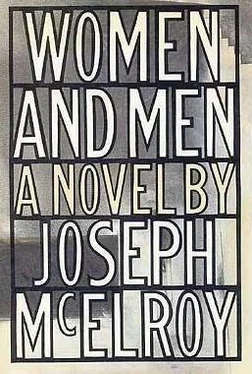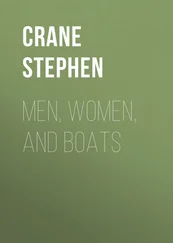Her father could bring Alexander the copy and seem worried to death and ask him what he thought, that bluff, bearded gray gentleman with a family mole on his jawbone like a dark stone beneath running current; and Alexander knew then that he was going to go after her.
"Uncle Jim will be glad to have word of those union people in Pennsylvania, but how far do you intend to go?" his cousin asked with a light of humor in his somewhat nasal voice. He laid the crumpled paper on the white bedspread beside the satchel that now contained socks and long underwear.
Anger—"Do you know that Mrs. Lodge asked me if I had seen any Venetian glass with that special exquisite crudeness. I took her reference as being to Ruskin and asked in turn if she found the living wage advocated in the Gospels, but she may not have taken my reference for she said God helps those who help others to help themselves, I think that’s what she said, maybe not, maybe not, and she asked me what sold newspapers and I said sometimes it seemed to me imponderable, but I had lost my wits because I felt she was telling me something I wasn’t comprehending, or making fun of me, and she said she would like to introduce a young man like me to Mr. Roosevelt."
His cousin laughed and straightened his necktie in the mirror. "An imponderable young man. A vendible imponderable."
"Oh dry up," said Alexander, examining a stickpin Margaret had given him a year ago Christmas and wondered if it was a real emerald.
"Are you really going to Pennsylvania as a journalist, Alexander?"
Anger at the imperfect curves and edges of Venetian glass, anger at Paris — for, yes, he might just go to Paris with this cousin with the square head and fat jaw — while between the lines and more finely still between the words, he felt his dear Margaret was in trouble and he didn’t know what it was and it might be his trouble, and, worse, it might not be his at all.
"A self-made sandstone-quarry businessman from Selinsgrove, Pennsylvania, indeed," he said. "Is that where his quarry is, then?"
"I know not a thing about Jacob Coxey," said Alexander’s cousin, "but his heart is in the right place."
"What place is that?" said Alexander suddenly and did not know why, but felt he was watched, no doubt by townsfriends and family who wondered with him what his supposed fiancee was doing between the lines of her less frequent dispatches — so he could not see in the great banks of leaves out the window anything but the future as if it already existed contemplating him with doubt.
His cousin was laughing at what he had said. "Where is Selinsgrove?"
"On a river," grumbled Alexander. ‘The Susquehanna, or anyhow close by it."
"What did you mean ‘one thing’ and ‘another thing’ and you didn’t know ‘which fits inside which’?"
"Don’t dissect me — I don’t know what I meant," said Alexander, looking toward the bedside table. "It’s between the lines."
"I wouldn’t read there if I were you," said his cousin.
"Hmpf," grunted Alexander, placing two small leather-bound volumes in one corner of his satchel. "I read wherever I go."
His cousin laughed and reached for his jacket where it lay folded on a chair. "I meant between the lines, not Selinsgrove-hard-by-Susquehanna."
"I will be near there," said Alexander.
"It should be an education," came the answer.
The river in late February was moving. A brown bird stood briefly on a miniature raft of ice. The town nearby was for a few tranquil hours a future that could not be rushed. He vowed that whatever happened he would come back to this point on the riverbank. He had a stone in his shoe.
In the wrong town you can still pick up news. Jacob Coxey dealt in scrap iron before he went into the business of quarrying sand for steel and glass manufacture. Now raised race horses in Kentucky, though didn’t live there. But didn’t live here in Selinsgrove either. Selinsgrove — more woods than New Jersey, but much like. But Coxey was only born here. Moved, at five or six: picture of small boy directing adults which bed to load into which wagon, the wide wagon, the narrow wagon. Settee and wash tub. Fire-irons and spade. Caned chairs sitting on top of crates. Somewhere a German accent. To Danville, downaways. But not far. And furthermore not where Coxey, with a growing name among Greenbackers and Populists, lived now. The farmer he asked, the storekeeper he asked, the man with the unconscionably high forehead he asked in front of the church did not ask him the question he asked himself, a young fellow with a black leather satchel and an already somewhat distinguished scalp: What was he doing in Selinsgrove if he was looking for Coxey? The question took him some miles back to the riverbank he had come from, but not to Danville — but not because Jacob Coxey was no longer there either but in Ohio, if Alexander had only asked, to begin with.
He had mailed an exemplary dispatch from Philadelphia. He had mailed another the next day to Margaret’s father from a place called Laurel Summit.
Some said armies of unemployed would take over the railroads. Constantly, it was only Margaret he had seen — Margaret on her way long since to interview — but who knew? — a man "of Selinsgrove, Pennsylvania," as her written words put it. Alexander had waited for months for her, and now in motion himself had "waited" for word to come to him somehow as he had made his way into north-central Pennsylvania as if her word in print meant she must be there where Coxey was "of." But a most irresponsible way to seek her — as if he had bent his will or had needed for months to cut adrift in his own small way westward — to be not home if she arrived — his absence noted: while now he had uncharacteristically built himself a lean-to and produced from his bag shadowy food to eat beside the current of the shadowy river, arrived there for no good reason, but watched — by his children, it suddenly came to him, of which he had not yet any — for he had not yet his bride.
He understood only brief, separate things, like beginning nowhere. He was tired. No good cause explained his being here. The wistaria that he could smell but weeks away outside his bedroom window at home was named for the man who wrote the first American anatomy (two volumes, Caspar Wistar, honored hardly more than a year ago at the opening of the Wistar Institute of Anatomy and Biology housing the collection of anatomy he left at the University in Philadelphia). The night came around so mossy-cold and so blank that it was no different from the river at first, even the dubious head of the night’s body through the maps of tree branches, that moon tilted away far where things of true importance were going on while Alexander, instead, pursued some alien education, as his cousin the medical student predicted. Some new history, was it? A voice nearby, a woman’s voice, for a second seemed caused by the darkness but (no) came with it: "I camped last week by a river under a long shining cloud and a man there breathed in a dollop of that cloud, I saw him, it was a long spill of light and he breathed in a whole dollop of that cloud, I saw him, it was a long spill of light and he breathed it in and coughed and talked, and he was well-informed."
Alexander saw that he had already seen the blonde woman when she spoke and had trusted the human figure in the corner of his eye. He had predicted her appearance through some study of history; that was it.
Eyes closed, resting, he’s a very old man, his hat in his lap, the straw upon the heel of his palm, fingers resting in the crumpled crown, air sliding and curling like water over his skull; and he foresaw what is happening in the sun of a backyard the ownership of which hardly matters any more, only the people small and tall who use it, the little girl with long light hair throwing a ball up and up and up again and catching it in one hand nearer and nearer her grandfather in his chair; and he is not dopy, and knows his grandson whose daughter this little girl is knows he is not dopy and would not make anything of his not at once replying to the question his grandson asked; and when, with his eyes closed, he had an answer, he heard a powerful whoosh and did not open his eyes, it might be an exciting death coming his way and he heard a young gasp and knew his great-granddaughter had caught her ball practically in his lap, but he had the words in his throat answering Jim’s question: "In his letter that he wrote me when I was all of six years old, his last letter and he was up in New York visiting the Indians and the envelope had a bright red scarab seal on it, and he said he had dreamt of swallowing something, I know what it was, it was a storm he swallowed, complete with rain, thunder, lightning, what’s that other? hail —the works — and then singing out his name in the dream which was Morgan of all things, but something else, Jim, I really forget but it had to do with the spelling."
Читать дальше












